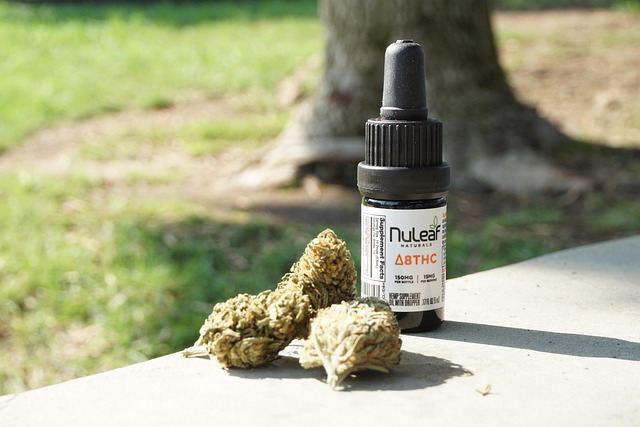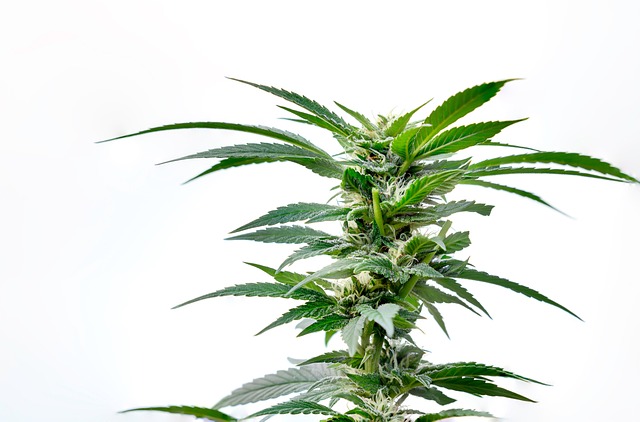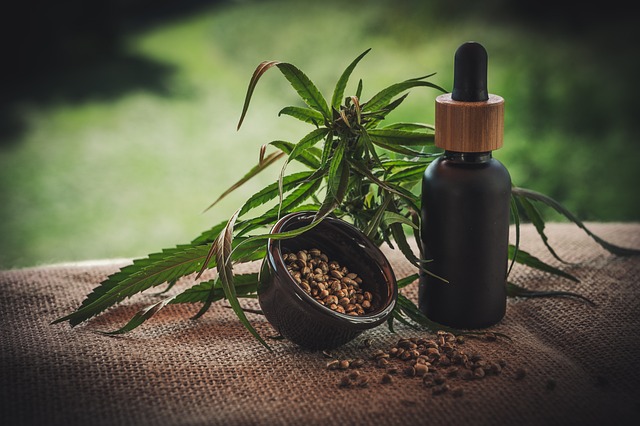Full Spectrum Hemp Oil (FSHO) has gained popularity as a natural wellness solution due to its retention of all chemical compounds found in the hemp plant, including CBD and THC. Unlike isolated or distilled forms, FSHO benefits users through the entourage effect, enhancing therapeutic advantages. THC, one of over 100 cannabinoids, contributes unique effects and is subject to evolving legal landscapes. Decoding product labels is essential for understanding THC content. Scientific evidence supports FSHO's potential health benefits, but consumption carries side effects. Versatile consumption methods include oral, topical, vaporization, and infusion in food/beverages. Prioritizing safety and quality assurance through third-party testing is crucial. The market for FSHO is rapidly evolving due to increasing legalization and improved cultivation methods.
“Unraveling the complexities of Full Spectrum Hemp Oil (FSHO) with THC, this comprehensive guide offers a detailed journey through its multifaceted world. From understanding the essence of FSHO and its legal standing to decoding product labels, we demystify every aspect. Explore scientific insights into its benefits and be informed about potential side effects. Discover diverse consumption methods, safety measures, and emerging trends shaping the future of FSHO with THC. Dive into this extensive overview to become an enlightened consumer.”
Understanding Full Spectrum Hemp Oil: A Comprehensive Overview

Full Spectrum Hemp Oil has gained significant attention in recent years as a natural alternative for various wellness concerns. Unlike isolated or distilled forms, full spectrum oil retains all the chemical compounds found in the hemp plant, including cannabinoids like CBD (Cannabidiol) and THC (Tetrahydrocannabinol). This means it offers a broader range of potential therapeutic benefits due to what’s known as the entourage effect—where these compounds work synergistically.
When you choose Full Spectrum Hemp Oil, you benefit from a complex mix of plant-based molecules that can positively interact with your endocannabinoid system, which plays a crucial role in regulating mood, sleep, and pain perception. The diversity in cannabinoids and other phytochemicals contributes to the oil’s complexity, making it a popular choice for those seeking holistic wellness solutions.
The Role of THC in Hemp Oil and its Legal Implications

THC, or Tetrahydrocannabinol, plays a pivotal role in hemp oil, contributing to its therapeutic properties and distinctive effects. It’s one of over 100 cannabinoids found in the cannabis plant, including both marijuana and hemp. In Full Spectrum Hemp Oil, THC works synergistically with other cannabinoids and terpenes to create an entourage effect, enhancing the overall benefits. While it’s known for its psychoactive properties, leading to feelings of euphoria, modern research highlights its potential medicinal uses.
The legal implications surrounding THC in hemp oil are complex. Historically, cannabis’ scheduling as a controlled substance globally has made its production and distribution challenging. However, recent changes have led to the legalization or decriminalization of hemp and its derivatives in many countries. This shift has opened doors for scientific exploration and commercial utilization of Full Spectrum Hemp Oil. Products containing THC must adhere to strict regulations regarding labeling, dosage, and marketing claims to ensure consumer safety and compliance with legal standards.
Decoding Product Labels: Identifying THC Content Accurately

Decoding product labels is crucial when purchasing Full Spectrum Hemp Oil or any cannabis-derived product to ensure you know exactly what you’re buying, especially when it comes to THC content. The label will provide information on the concentration of tetrahydrocannabinol (THC), usually measured in milligrams per milliliter (mg/ml) or as a percentage (%). This data is vital for consumers who want to understand the potency and effects of the product.
Accurately identifying THC content involves scrutinizing the label for key terms like “THC,” “hexane-extracted,” “full spectrum,” or “concentrate.” Full Spectrum Hemp Oil, for instance, encompasses all the natural compounds found in the cannabis plant, including THC, CBD, and other cannabinoids. The label should also indicate the extraction method used to obtain the oil, as different methods can impact cannabinoid preservation. Understanding these details empowers consumers to make informed decisions based on their desired effects and ensures a safe, enjoyable experience.
Benefits of Full Spectrum Hemp Oil: Scientific Insights

Full Spectrum Hemp Oil has gained significant attention in recent years due to its potential therapeutic benefits, backed by growing scientific evidence. Unlike isolated or distilled forms, full spectrum hemp oil preserves all the natural compounds found in the cannabis plant, including a range of cannabinoids like CBD (Cannabidiol) and THC (Tetrahydrocannabinol), as well as terpenes and flavonoids. This complex mix of molecules is believed to work synergistically, enhancing the overall therapeutic effect often referred to as the “entourage effect.”
Research suggests that full spectrum hemp oil may offer a variety of health advantages. For example, THC has shown promise in alleviating chronic pain, reducing inflammation, and aiding sleep quality. CBD, another prominent component, is known for its anxiolytic (anxiety-reducing) properties and potential benefits for managing post-traumatic stress disorder (PTSD). Terpenes, present in full spectrum hemp oil, contribute to the plant’s aroma and may also possess antimicrobial and anti-inflammatory qualities. Scientific insights continue to uncover the complex interplay between these compounds, highlighting the potential of full spectrum hemp oil as a natural approach to wellness.
Potential Side Effects and Precautions when Consuming THC

When consuming THC, whether from full spectrum hemp oil or other sources, it’s crucial to be aware of potential side effects and take necessary precautions. While many people tolerate THC well, individual reactions can vary significantly. Common side effects include dry mouth, eyes, and skin, as well as increased heart rate, dizziness, and a feeling of euphoria or anxiety. For some, THC may also impair cognitive functions and motor skills, affecting coordination and judgment.
Precautions are especially important for those with pre-existing medical conditions, such as heart disease, anxiety disorders, or lung issues. It’s recommended to start with low doses and consume in controlled environments to minimize risks. Additionally, staying hydrated, maintaining a balanced diet, and ensuring adequate rest can help mitigate some side effects. Avoid operating heavy machinery or engaging in activities that require heightened focus immediately after consumption.
Different Consumption Methods for Full Spectrum Hemp Oil with THC

Full spectrum hemp oil with THC offers a variety of consumption methods for consumers looking to harness its potential benefits. One popular method is oral consumption, where individuals can take capsules or ingest the oil sublingually. This allows for a slower release and longer-lasting effects, making it convenient for those seeking subtle, all-day relief. Another common approach is topical application, with hemp oil-based creams and balms that are massaged into the skin. This method offers targeted relief for specific areas of discomfort or inflammation without the risk of systemic absorption.
For those who prefer a more interactive experience, vaporization is a popular choice. Using a vape pen or similar device, users can inhale the vaporized oil, enjoying its effects almost instantly while also avoiding potential respiratory issues associated with smoking. Additionally, full spectrum hemp oil can be infused into various food and beverage products, offering a delicious way to consume THC. From edibles to tinctures, these creative methods provide diverse options for individuals looking to integrate full spectrum hemp oil with THC into their wellness routines.
Exploring the Safety and Quality Assurance in THC-Containing Products

When exploring THC-containing products, such as those derived from full spectrum hemp oil, safety and quality assurance are paramount. It’s crucial to understand that THC, the psychoactive compound in cannabis, can have varying effects on individuals due to factors like tolerance, weight, and overall health. Reputable manufacturers adhere to stringent regulations and quality control measures to ensure consistency and purity.
Third-party testing is a critical aspect of this process, verifying the presence or absence of THC and other cannabinoids, as well as ensuring safety from contaminants. Look for products that are transparent about their sourcing, extraction methods, and third-party test results. This transparency reassures consumers of the product’s quality and purity, fostering trust in the brand and promoting responsible consumption.
Future Trends: The Evolving Landscape of Full Spectrum Hemp Oil with THC

The market for Full Spectrum Hemp Oil (FSHO) is experiencing a dynamic evolution, particularly with the growing acceptance and research into the potential benefits of THC (tetrahydrocannabinol), one of the most well-known cannabinoids in the hemp plant. As consumer demand continues to rise, future trends suggest a more integrated approach to healthcare and wellness, where FSHO products will play a significant role. This involves exploring innovative delivery methods that cater to diverse consumer preferences while maintaining the integrity of the full spectrum oil.
The increasing legalization of cannabis worldwide has led to advanced cultivation techniques and enhanced extraction processes, ensuring purer and more potent Full Spectrum Hemp Oils. With advancements in technology, brands are now able to offer a wide range of products, from tinctures and capsules to topicals and edibles, each tailored to specific needs. This expansion opens up new opportunities for personalized wellness routines, leveraging the synergistic effects of the entire hemp plant.
